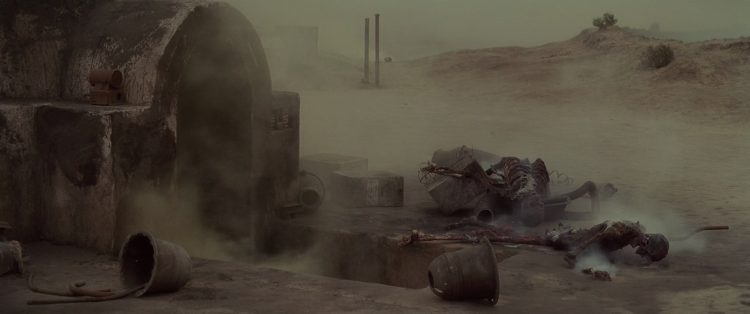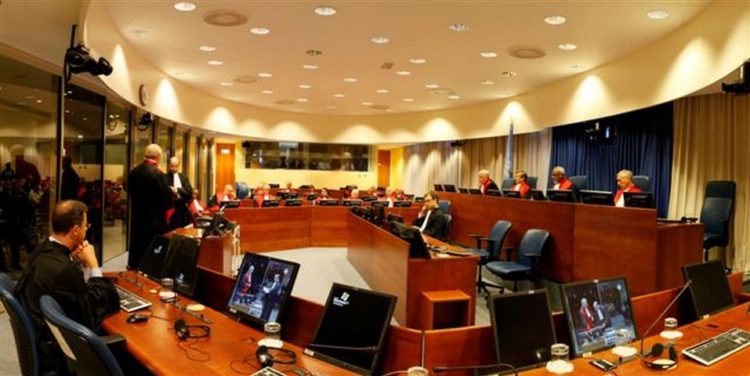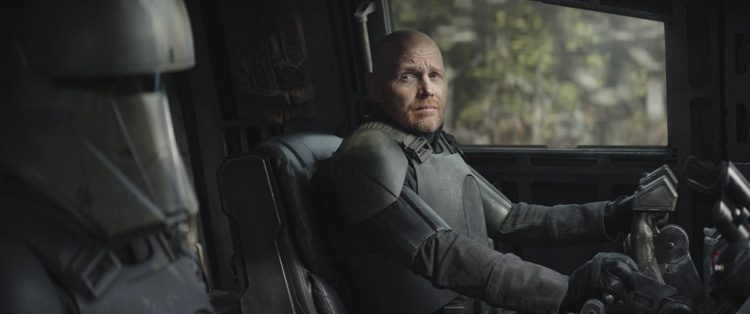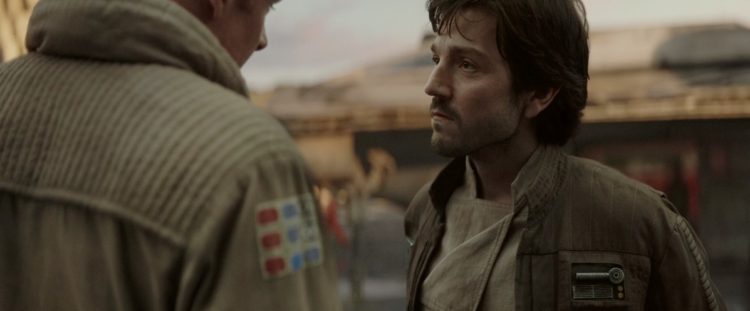I want to say up front what this piece is and what it isn’t. I think it’s about time we had a conversation about how war crimes are depicted in Star Wars, and why it’s worth talking about. I don’t plan on making this a listicle of war crimes and I don’t intend to make this piece inaccessible or hyper-technical, either. I think it should be the opposite. Star Wars is, among other things, a fairy tale with a strong moral element: there are heroes and there are villains. It includes political commentary based on real history and real life: most obviously with the fall of the Republic and rise of the Empire. As part of that framework, I think it’s very important how certain acts of war are portrayed in Star Wars – especially when those acts are performed by heroes rather than villains.
I first started thinking about this idea at a convention a few years back, when a Star Wars creative mentioned to another creative that “you know, technically Obi-Wan’s fake surrender in The Clone Wars is a war crime.” I don’t know how that person felt about it, but that comment stuck with me because it would be so easy to read it as an amusing bit of trivia. Oh, that dastardly Obi-Wan, committing war crimes. When several years later, the final arc of the revived Clone Wars made a call-back to the false surrender by having Anakin pull the same stunt, I actually needed to stop and think about that for a while. At this point, I am sure the people behind Star Wars know that false surrender – also known as perfidy – is a war crime. It’s possible they may not have known the first time (I certainly didn’t, since I hadn’t studied the law of war yet in 2008), but they decided a callback was important enough that it had to happen again. Now, maybe it was on purpose – maybe Anakin and Obi-Wan were meant to be acting in morally-questionable ways during wartime as part of the portrayal of the Jedi and Republic in decline. But I hardly think so, because the show doesn’t communicate at all that there’s anything wrong with what Anakin and Obi-Wan did with their false-surrender gambits.
This bothered me. A lot. Why? Surely Star Wars – as a fictional setting – doesn’t have the same laws as the real world? They may not have the equivalent of the Rome Statute, Geneva Conventions, or the Hague Conventions. Why get wound up over something technical, like sound in space or lasers moving slower than light speed? It’s just fun! But that’s the thing – I don’t think it’s just harmless fun. Not if we see Star Wars as a fairy tale with any sort of moral purpose.
Reasonable minds can differ over whether false surrender is too technical to be bothered with. That’s fine! But you don’t need a primer in international law or the law of armed conflict to understand at a fundamental level that certain things are wrong. Let’s take the killing of civilians, something that happens all over Star Wars. There are tons of treaties, laws, and customs about when you can and can’t kill someone. But at the end of the day, nobody needed an academic degree to watch the original film and understand that stormtroopers murdering Uncle Owen and Aunt Beru was wrong, and everybody understood how monstrous blowing up Alderaan was. A New Hope treated those moments with the emotional and narrative heft they deserved. That’s really all I’m asking for: for Star Wars to be consistent with its own moral code.

So let’s talk about some other things that I think Star Wars might want to take as seriously as it took those moments.
Why does this matter?
Okay, so Star Wars is a fairy tale about good and evil. But are war crimes such a big deal? Well, we need to talk about what war crimes are and what do we mean by the law of war, also known as the law of armed conflict (LOAC) or international humanitarian law (IHL – not the same thing as international human rights law, IHRL).
At a very high level, war crimes are what the nations of the world have agreed are beyond the bounds of warfare. The law of war recognizes that war involves killing, so things that would normally be crimes at any other time (e.g., murder) are not during times of war, subject to certain rules. This is called the “combatant’s privilege”. For centuries there were a lot of unwritten customs about war, things like protecting envoys and not attacking churches. In the twentieth century, we began to realize that these norms were not universal and that leaving them as “norms” wasn’t good enough, so we started writing them down in international treaties such as the Hague Convention. The basic gist is that we wanted limits on war, and the best way to do so was by mutual agreement: if I don’t want someone to go too far, I have to promise I won’t go too far either.
Then the world wars happened. World War I with its chemical weapons and World War II with its mass destruction of civilian populations – and both involving genocides against civilian populations. A whole raft of treaties followed – the Geneva Conventions and their additional protocols for warfare, the Refugee Convention, Genocide Convention, and others for human rights law. One of the things to come out of the post-war bevy of treaties and international criminal tribunals (such as Nuremberg) was the idea of individual criminal liability for war crimes and grave breaches of human rights law: you could no longer hide behind combatant’s privilege or following orders if you committed certain violations of international law. You were personally on the line if you committed certain crimes, even while following orders (and militaries around the world began to teach the idea of refusing unlawful orders).
The twentieth century continued its march towards ensuring certain crimes would be punished – the United Nations created international military tribunals for war crimes in Rwanda and the former Yugoslavia. Many nations ratified the Rome Statute which established the International Criminal Court at the Hague, the first standing tribunal dedicated to prosecuting individuals for grave breaches of international law. But accountability was still hard – nations had to agree to join the ICC. The United States famously helped set up and create the ICC, and then refused to make itself subject to it – the ultimate “rules for thee but not for me”. What good is accountability if the most powerful nations are like “nah, we’ll pass”?

The most powerful nations of the world trumpet their own accountability – the US in particular likes to think it doesn’t need to join the ICC or make its soldiers accountable to international scrutiny because we’re very good at holding our own troops accountable and following the laws of war. Sometimes we are – we certainly train our troops very thoroughly on the laws of war, and our military courts take war crimes very seriously. But sometimes we fail very badly. And that’s the problem.
War crimes aren’t technicalities, like parking a car slightly in the red zone. They’re meant to be very serious no-go zones in war, and accusations of war crimes are meant to shock the conscience. They’re very big deals. Grave breaches of international law – which can be committed by civilian authorities (think of horrific acts like genocide or crimes against humanity) – are the same thing. We wrote all these down so we could say “never again” after the horrors of the 1930s and 1940s. But they do happen again. They happen all the time – and when they happen in other countries, we’re full of outrage. But when our own countries do them – and as an American I refer to the US, but this applies to everyone – the outrage is more muted. It’s easily forgotten, replaced by the latest outrage when it really shouldn’t.
Get back to Star Wars already
Right, right – so where does Star Wars come in to all this? Let’s talk about how war crimes are used in Star Wars and how the audience responds to them. When stormtroopers kill Luke’s relatives or Tarkin blows up Alderaan, we care – narratively – because we relate to the characters and understand their pain. When the First Order blows up Hosnian Prime, we kind of shrug, because we don’t know that planet (and if we reacted at all, it was because we thought it was Coruscant, a planet we’d had a whole trilogy and a ton of EU to get to know).
Does this sound familiar? If someone we know is murdered, we care quite a bit. If we don’t know them, but can empathize with them either by envisioning ourselves in their shoes or by getting to know their story through news coverage, we can also care quite a bit. But if we hear a story that says “fifteen civilians were killed by soldiers in Iraq the other day” we almost ignore it as background noise. Part of that is distance, part apathy, and part may even be racism – all of which are a failure to identify with the victims and therefore to feel any abhorrence at the crime. It’s telling too that people react more emotionally to damage to a church they’ve heard of and would like to visit someday – Notre Dame – than to unnamed civilians in a place they’ll never visit and have written off. It’s about distance and framing.
Star Wars does the exact same thing. Star Wars is very very good at framing – when the narrative wants you to care about something, by golly, it’ll make you care. But when it doesn’t – it won’t.

A key example that stunned me by how off-kilter it was? The season-two episode of The Mandalorian called “The Believer”. As part of the story, we learn that the former Imperial sharpshooter Migs Mayfeld was a part of the Imperial Security Bureau – the Empire’s Gestapo – and participated in Operation Cinder. Operation Cinder is the Star Wars equivalent of Hitler’s plan to vengefully burn down Paris when he was losing the war – except it was a dead-hand order from Emperor Palpatine to punish the galaxy for his downfall by literally burning entire worlds. We learn that Mayfeld participated in Cinder and had trouble sleeping because of what he had to do, and the trauma causes Mayfeld to gun down his former commanding officer instead of playing it cool during a covert mission. He then plays a leading role in destroying a hidden Imperial facility – which was gathering explosive material for more atrocities against the galaxy – and though he had been a high-value New Republic prisoner, the heroes of the show let him go.
We can have a separate conversation about whether Mayfeld warranted forgiveness or a second chance – my personal view is that one act of contrition is the beginning of absolution, not the end of it – but I want to focus on how the audience’s sympathies were engaged with Mayfeld rather than with thoughts of his victims. The episode wanted us to feel for Mayfeld and how he’d suffered, and the well-acted scene underscored that. There’s nothing wrong with that, but I thought it was troubling how the episode failed to engage at all with the horrific nature of Operation Cinder except in how it affected Mayfeld.
Star Wars does this a lot. Another Imperial Security Bureau agent who participated in an atrocity – this one an actual genocide – received a nice easy redemption arc in Star Wars Rebels. Agent Kallus bragged about wiping out the Lasat species in one episode, and the show only re-engaged with that idea a couple seasons later by showing us how sad he was about it and how he was forced to go along with it. That we care about the Lasat at all is only because of a main cast member, Zeb, being a member of that near-destroyed species. Otherwise, I’d almost think that the only thing the narrative wanted us to care about was how sad it made poor Kallus to have to help wipe out an entire species.
Star Wars can and should do better
Star Wars already has the narrative tools to do justice to important and weighty ideas. It may be a fairy tale for kids, but it still had room for an entire trilogy about the political corruption of a functioning democratic republic. The first film underscored the evils of the Empire in a direct and personal way. Star Wars knows how to handle serious topics in a moral way, and it knows how to make viewers engage with and care about these things.

Let’s take the framing of Rogue One as an example. That film did a great job of setting up moral complexity for the heroes – it begins with a member of the Rebel Alliance killing another Rebel operative, something that shocks the audience because we understand the Rebels aren’t supposed to act this way. It continues by having a Rebel intelligence chief order a hit on a character we care about, because he’s the father of our main protagonist. Thus, we understand General Draven ordering Cassian Andor to kill Jyn Erso’s father is morally-questionable even if it’s for the supposed greater good. This is great stuff!
Rogue One also gives us a split in the larger rebel movement – we’re given to understand that Saw Gerrera is too extreme for the Rebel Alliance, and this is communicated through his paranoia and torture of another protagonist, though at that point we’d barely met Bodhi Rook. It might have been better if we’d gotten a clearer sense of the greater good Gerrera was trying to achieve through his extremism – Star Wars Rebels does a better job at this – but the seed is at least there for the audience to think about it. Is Gerrera’s way better, or is Mothma’s? I’ll leave it there because the Partisans versus the Rebel Alliance could warrant another article entirely, and I could talk at length about how Star Wars compares and contrasts military leaders and civilian senators (and sometimes not in a healthy way).
The point is that Star Wars has all the language and tools needed to portray war crimes and atrocities in a sensitive and thoughtful way. I just wish that it would use them – I don’t mean that Star Wars can’t be fun and games or that people can’t root for the Galactic Empire in a fictional fairy tale. I just wish that the narrative would lean harder on the audience to care about those unnamed civilians, because our desensitization to acts of violence against civilians in fiction mirrors our same desensitization in reality.
What do I mean by this? Well, the audience isn’t going to care too much about random people they don’t know getting killed in Star Wars. Of course, this franchise would quickly get emotionally draining if all we saw were victims of tragedy – but there are ways to avoid trivializing harm. Take the Mayfeld episode of The Mandalorian. Let’s say we want to preserve the narrative arc of the episode as much as possible. Could we make a slight change to the episode?
I think we could. I think we could have Mayfeld voice a desire to help the civilians on the planet formerly garrisoned by the Empire, and then regretfully remember that he’s off to New Republic prison. The rest of the episode carries on as is, including the gag about Mayfeld being let go, except this time we know how he’s going to use his newfound freedom: in voluntary redemptive acts of service. It’s a tiny change, but it showcases an awareness that Mayfeld’s trauma isn’t the only tragedy of Operation Cinder, and that the people the Empire hurt are important too. It’s entirely possible Mayfeld goes on to make such a decision offscreen once he’s given his freedom (we don’t know) but I think there’s a power in showing such a decision on screen, because it highlights the importance of reparative work for victims of atrocity.
We can care a little more in our fiction – we’ve done it before – without losing the fun escapism that fiction is.


This reminds me of a discussion I had with someone who wasn’t fond of Bo Katan after her turn since her past crimes were pretty much just brushed aside
Part of this with Kallus and Mayfeld stems from the idea that the Empire and similar evil groups are horribly damaging even to their own side, as a part of Star Wars’s theme that evil is inherently self-destructive and harmful even to the evildoer. But I do see your point.
You know what Star Wars story touched on this really well? The Clone Wars episode “Innocents of Ryloth.” The Waxer/Boil/Numa interactions really make you feel for the local Twi’leks, and it’s one of the only direct acknowledgements of the civilian cost of war in Star Wars.
The Rebels episode “Ghosts of Geonosis” also approaches this in an interesting way. On the one hand, the Geonosians (who have always been dehumanized in a negative way) are almost entirely absent, not even as corpses. On the other hand, I think the episode does a good job of using that to emphasize the horrific scale of the Empire’s crime, and does make the viewer side with the Geonosians (who had always been evil cannon fodder before).
As a side note, the fake surrenders are a part of a long and somewhat disturbing tradition of Star Wars media (particularly non-movie visual media like Rebels and The Mandalorian) of heroes exploiting any inch that the villains give them. Beyond fake surrenders, just try and count the number of times that villains go for a capture instead of a kill, or a stormtrooper spends a second shouting “Put your hands up!” or something, only for the “good guys” to reward their lack of bloodthirst with death. Given that Star Wars heroes (with the partial exception of the Rebels Jedi) effectively never use nonlethal force or take prisoners or accept surrenders (not that they are offered very much) and it becomes really disturbing after a while.